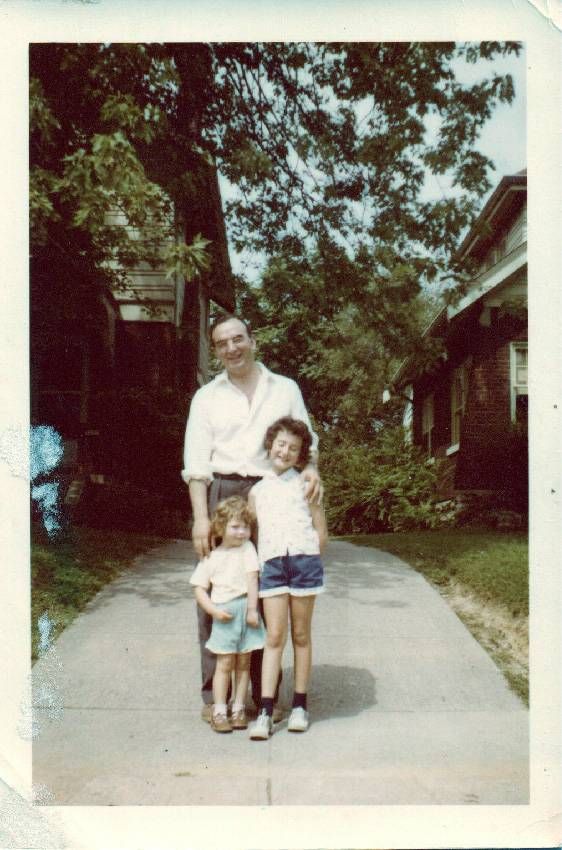My Formidable Father Made Me a Feminist
Following my divorce, he displayed pride in my independence but also helped in his own way
"You are not going to stand over a stove, cooking dinner for some layabout." I was about six years old when my dad first made this declaration. It was directed at my older sister, but she was probably also too young to grasp his meaning. "What was a layabout?" I wondered. "And why would my sister want to cook dinner for one?"

As I grew older, I came to understand that my father had a whole suite of ideas about raising girls that were unconventional in the 1960s. I was never his "princess" or even his "little girl." I don't remember him ever commenting on my appearance other than to tell me that my face or hands were dirty. His praise was saved for good performance at school or for helping out at home.
I was my dad's preferred helper when he went to the hardware store and when he embarked on a handyman project in our house. But my favorite father-daughter outing was when I went with my dad to the hospital where he worked as a pathologist to check on the pregnancy tests.
In those days, pregnancy was confirmed by injecting a mother's urine into a rabbit to see if the rabbit's ovaries would become enlarged. I loved the rabbits and although my dad did not believe in sugarcoating the truth, he was sensitive enough to hide the fact that the rabbits were going to die at the end of the test.
My father was generally open minded and curious, but he showed no flexibility when it came to education.
The Value of a Profession
My father was generally open minded and curious, but he showed no flexibility when it came to education. He told my sister, my brother and me that he would support us through university, followed by law or medical school. In this, he was entirely dogmatic but also gender blind.
His faith that a profession was the best way forward in life was likely based on his own experience. He was one of a small number of Jewish graduates from medical school in England, during the Second World War. My dad's education had provided him a skill that made it possible for him to immigrate to Canada, leaving behind the depressed society of postwar Britain.
I will never forget the day that my dad drove me from Windsor to Toronto, to start university. When the car drew up in front of the student residence, my dad unloaded my enormous trunk, the floral bedspread and pillows from my childhood bedroom, my Jimi Hendrix poster and a food package carefully wrapped in tinfoil by my mother, onto the sidewalk and gave me a stiff hug.
"You should call your mother to let her know you got here," he said. "She will be worried." Then he wished me good luck and drove off to his meeting. He was clearly more confident than me (or my mother) that I would be all right at this huge school, in the middle of an enormous city.
"You should call your mother to let her know you got here," he said. "She will be worried."
I never resented my father for pushing me to become a lawyer. When I started working in the early 1980s, Toronto's Bay Street firms were an exciting place to be despite the sexism and the brutal hours.
After I had kids, I found the balancing act of motherhood and career exhausting and landed a government job with more humane hours. In my late 30s, when my marriage ended, my career proved to be my life raft. I didn't suffer a dramatic drop in my standard of living or the loss of identity that often accompany a marriage breakup.
His Invaluable Support
It was during my divorce that my father showed a side of himself that I had never seen before. He was protective, constantly fussing over me and trying to find ways to make my life easier. Initially, he told me that he and my mother had decided to move to Toronto to help take care of my kids, then aged nine and six. When I told him that I couldn't imagine anything that would make me feel more pathetic than having my parents move in with me, my dad took the hint.
But he showed up on a regular basis. One weekend he drove to my home to drain my radiators, a job he performed with tremendous zeal. After prying the tops off the radiator covers, he left me to retrieve them from around the house and reattach them. Another weekend, he decided to clean the chimney flue, scattering ash liberally over my carpets while muttering loud enough for me to hear that I shouldn't have ignored this cleaning job for so long.
Although I never found my father an easy guy to have around, particularly as a stressed-out single mother, he supported me in important ways. He was always happy when I came home for a few days, making me feel like I was his favorite visitor. He was full of praise for my ability to lead my life independently, complimenting me on my strength and determination. He always told me that I was a good mother, even when I doubted myself.
He always told me that I was a good mother, even when I doubted myself.
There is a saying attributed to Abraham Lincoln, that the greatest gift a father can give his daughter is to love her mother. I know that my dad gave me this gift. He was the breadwinner in my parents' traditional 1950s marriage, but he knew that he would be lost without my mom. She had the practical skills as well as the warmth and charm he lacked. My dad's respect for my mother provided me with a standard for how a woman should be treated by her partner.
I celebrate his memory and am grateful that I was raised to make my own decisions.
Editor’s note: An earlier version of this piece was originally published in The Globe & Mail and is being republished with permission.


